History
Curriculum Intent
History is an exciting and engaging part of our school’s curriculum. We use the Ark Curriculum Plus scheme which is carefully mapped out so that all pupils leave primary school equipped with an understanding of the past that paves the way for their future.
Throughout their journey in history, pupils will acquire a breadth of knowledge of places and people, and significant events through time. Pupils will be given the opportunity to develop their ability to ask perceptive questions, think critically, analyse evidence, examine arguments, develop judgement, and understand differing perspectives.
We hope that these skills will support pupils to reflect on the constant process of historical change and the diverse nature of societies and relationships, equipping them as global citizens to face the challenges of their lifetime.
At Gateway Academy, we promote the learning of History through cross-curricular activities and an enrichment programme of visits, visitors and workshops, designed to awaken and inspire our pupils’ inquisitiveness about the past.
The Curriculum
The Ark Curriculum Plus history curriculum ensures that children develop both substantive (‘the what’) and disciplinary (‘the how’) knowledge.
Over time, pupils will build up their understanding of 19 different substantive concepts such as chronology, government, power and civilisation, meeting them throughout their history lessons from Year 1 to Year 6.
We also want pupils to understand the contested nature of history and how we have arrived at establishing these facts about our past. Each lesson will include one of these disciplinary concepts, such as cause and consequence, similarity and difference or interpretation.
Early Years Foundation Stage (EYFS)
The early learning goals at EYFS are very much focused on the memories of the child. It may be that they are asked to remember a special event or routine or custom for their family. They may talk about differences between different family members or different generations.
Key Stage 1 (Years 1 and 2)
In Key Stage 1, pupils develop their understanding of the past - beginning with familiar objects and places within living memory before moving beyond living memory. Pupils study toys and transport in Year 1. They then further develop their understanding of the past by studying the lives of significant individuals both nationally and internationally as well as studying a significant event beyond living memory. Pupils study the Great Fire of London, kings and queens, and significant individuals who have made a difference in Year 2.
Key Stage 2 (Years 3 to 6)
In Key Stage 2, the curriculum divides into two main strands: a study of Britain’s past and a series of studies focusing on civilisations and people around the world.
When studying British history, units are taught chronologically from the Stone Age in Year 3 to the Roman invasions and an in-depth study into Roman Britain in Year 4, to the Anglo-Saxons, Scots, and Vikings, and ending with the Battle of Hastings in Year 5. After this chronological study of British history, in Year 6 pupils move to studying an isolated unit in modern history, chosen because of its significance: Conflict and Resolution—the First World War and the Second World War.
Units about world civilisations have been linked to the geographical studies of continents focused on in each year group. These civilisations often overlap with one another, and comparisons will be made between the civilisations in Africa, the Middle East, Europe, and South America, but also with the different periods of British history occurring at the time. Pupils gain an overview of the locations of the earliest civilisations before studying the Ancient Egyptians, the Maya, Baghdad in its Golden Age, and Ancient Greece.
Here is our curriculum overview:
The curriculum overview for the school is as follows:
|
|
Term 1 |
Term 2 |
Term 3 |
Term 4 |
Term 5 |
Term 6 |
|
Year 1 |
|
Toys over time How are toys today similiar and different from toys in the past? |
|
|
Transport and travel How has transport changed over time? |
|
|
Year 2 |
Kings and Queens Who was the most powerful British monarch? |
|
The Great Fire of London How did the Great Fire of London affect the people who lived there?
|
People who made a difference How did these significant people make a difference? |
|
|
|
Year 3 |
Stone, Bronze and Iron Ages How did life change for people living during these times? |
|
Ancient Egypt What does evidence tell us about Ancient Egyptian society? |
|
|
|
|
Year 4 |
|
Britain’s settlement by the Anglo-Saxons and Scots Viking and Anglo-Saxon Struggle for the Kingdom of England to the time of Edward the Confessor |
|
The Romans Why did the Romans invade Britain and how successful were they? |
Roman Britain How did the Romans influence Britain? |
Maya Civilisation What was life like in the Maya Civilisation and how do we know?
|
|
Year 5 |
|
|
Anglo-Saxons and Scots How did the Anglo-Saxons change England and what part did Scotland play? |
Vikings Were the Vikings just invaders? |
Baghdad and the Middle East What was the Golden Age of Islam and how does Baghdad compare to London in 900CE? |
|
|
Year 6 |
Conflict and Resolution
How and why did Britain fight in two world wars and how did they change British society? |
|
Ancient Greece Who were the Ancient Greeks and how did they influence the world? |
|
|
|
Recent Projects
Year 6 Project and Film: Regent's Park Mosque
Year 6 were invited to take part in a project with Historic England to look at the history of the John construction company, the group responsible for the building of the Regent's Park Mosque.
The children interviewed people involved in the construction of the mosque and went to visit the site. Here is the film that resulted.
Yr6 Project – Regents Park Mosque
Year 6 were invited to take part in a project with Historic England to look at the history of the John construction company, the group responsible for the building of the Regent's Park Mosque.
The children interviewed people involved in the construction of the mosque and went to visit the site. Here is the film that resulted:
Year 2 – The Great Fire of London
Year 2 visited St. Paul’s Cathedral who were learning about the Great Fire of London and Samuel Pepys. Actors retold the story and brought to life the characters of Samuel Pepys and Sir Christopher Wren. The children were fascinated and the visits were a great success.
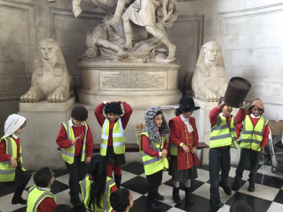
History Bus
We were lucky enough to be visited by the Home Front Bus. This mobile museum taught us about the Second Word War and provided us with a real insight into what life would have been like in Britain during the war. We were taken to safety in an air raid shelter, taught how to cook using rations, taught how to sew our own clothes, shown artefacts from homes in Britain during the war and saw real war medals! This was a fantastic way of making our learning interactive and we had a lot of fun!
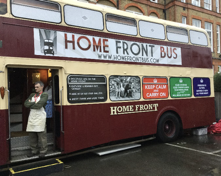 .
. 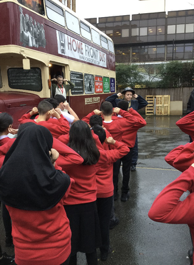 .
. 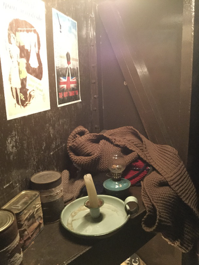
How Parents Can Help
Often there will be a history day at school. These days also provide something to remember and a link with the history being learnt.
Another way to help is to visit museums, historic houses and talk about the topics that they are doing. The children who love history are often the ones who have seen a love of the past in their parents. There are many free museums, especially in London. Use them as a resource and spend time sharing the past together. Otherwise, watch age-appropriate history programmes on TV.
There are some fantastic children’s books based in the past. Whilst these are often fiction, there will be facts and figures in the books that children will remember. Some good examples include anything by Caroline Lawrence (the Roman Mysteries), Goodnight Mr Tom (WW2 and evacuation), Stig of the Dump (Clive King) and picture books or non-fiction books that you can share at bedtime.
Further Support And Useful Weblinks
- The BBC website (though no longer being updated) has loads of links to videos, games and information a range of historical periods
- Try Teaching History with 100 Objects for some great ideas for using artefacts to teach history
 Gateway Academy
Gateway Academy